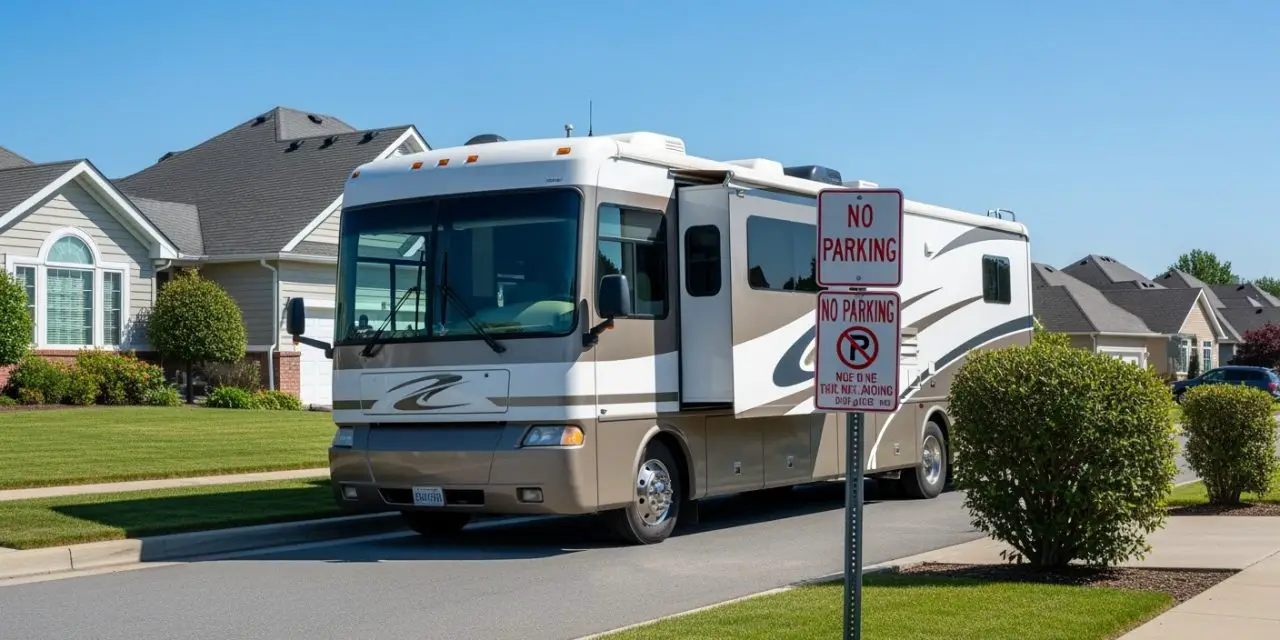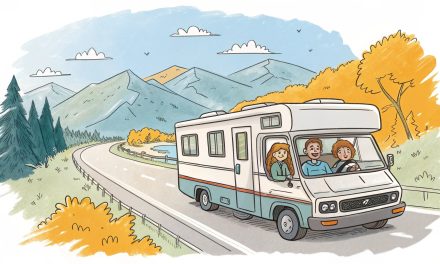Are you wondering if you can park your RV on the street? This question keeps many RV owners awake at night, and for good reason. With over 11.2 million American households now owning RVs according to recent statistics, street parking has become a hot-button issue.
Cities across America are cracking down on RV street parking with new ordinances, hefty fines, and strict enforcement. From Los Angeles adding bans to 30 more streets in 2024 to Cheyenne passing controversial oversized vehicle restrictions, the rules are changing fast.
The short answer is complicated – it depends on your city, your RV size, and dozens of local regulations that could cost you hundreds of dollars if you get them wrong.
1. The 72-Hour Rule: America’s Most Common RV Street Parking Law
The 72-hour parking limit is the golden rule that governs most American cities. This means your RV cannot sit in the same spot on a public street for more than three consecutive days. Cities like Seattle, Los Angeles, and Greenville, North Carolina strictly enforce this regulation.
Key Statistics: • 93% of cities have some form of 72-hour parking restriction • Average fine ranges from $25 to $250 for first violations
• Seattle processes over 15,000 72-hour violations annually • California Vehicle Code 22651(k) makes this a statewide law • San Diego allows up to 3 consecutive 24-hour permits (72 hours total)
Important Details:
- Moving your RV even one parking space resets the 72-hour clock
- Some cities require you to move at least one block away
- Weekends and holidays still count toward the 72-hour limit
- Street cleaning schedules can override the 72-hour rule
RV owners often think they’re clever rotating their vehicles every few days, but cities are catching on with digital tracking and neighborhood complaints.
2. Size Matters: Length and Height Restrictions That Could Cost You
Most cities don’t treat all RVs equally – size restrictions are everywhere, and they vary dramatically by location. The magic numbers you need to know are 22 feet and 25 feet, as these are the most common cutoff points.
Common Size Limits Across America:
| City | Length Limit | Height Limit | Weight Limit |
|---|---|---|---|
| Chicago | 22 feet | 8 feet | 10,000 lbs |
| Long Beach, CA | 22 feet | 7 feet | 10,000 lbs |
| Rancho Palos Verdes | 22 feet | 8 feet | 10,000 lbs |
| Phoenix | 25 feet | 8.5 feet | No limit |
| Denver | 30 feet | 9 feet | 12,000 lbs |
Would you like to save this article?
Critical Facts: • 22-foot limit affects approximately 40% of travel trailers • Class A motorhomes (averaging 35+ feet) are banned in most residential areas • Height restrictions typically range from 7-9 feet • Weight limits often cap at 10,000-12,000 pounds GVWR
Measurement starts from the bumper to the tip of the hitch – don’t forget to include your bike rack or spare tire carrier!
3. The HOA Nightmare: When Your Neighborhood Association Says “No Way”
Homeowners Associations (HOAs) are often stricter than city ordinances when it comes to RV parking. If you live in an HOA community, your street parking dreams might be crushed before they even begin.
Shocking HOA Statistics: • 85% of HOAs have RV parking restrictions • Average HOA fine ranges from $50-$500 per day • Time limits typically range from 24-72 hours maximum • Some HOAs require $25-$100 permits for temporary parking • Florida’s new law (effective July 2024) limits some HOA parking restrictions
Common HOA RV Rules:
- No overnight parking between 10 PM and 6 AM
- Loading/unloading only – typically 2-4 hours maximum
- Permit required for any street parking over 24 hours
- Seasonal restrictions during holidays or events
- Complete bans on vehicles over 20-25 feet
One Texas homeowner faced $500 daily fines for parking their RV in a relative’s driveway – HOAs don’t mess around when it comes to enforcement.
4. City-by-City Breakdown: Looking back at the 2024 RV Parking Ban Wave
2024 was a brutal year for RV street parking, with major cities implementing sweeping bans and restrictions. Here’s what’s happening in America’s biggest markets:
Cities That Implemented New RV Bans in 2024: • Los Angeles: Added 30 more streets to RV parking ban list • San Jose: Launched $3.3 million pilot program for RV street parking bans • Fremont: Imposed 72-hour limits with residential area bans • Cottonwood Heights: Restricted RV parking to just 12 hours • Cheyenne: Passed controversial “oversized vehicle” nuisance ordinance
Enforcement Statistics:
- Denver reported 343 complaints for large vehicle parking infractions in one year
- Los Angeles processes approximately 2,000 RV parking citations monthly
- Fine amounts typically range from $65-$250 for first violations
- Repeat offenders can face fines up to $500 and vehicle impoundment
The trend is clear: cities are getting tougher on RV street parking, and enforcement is ramping up significantly.
Lets see what this year end up looking like.
5. The Fine Print: What RV Parking Violations Actually Cost You
Getting caught parking illegally can be incredibly expensive. Here’s the real cost breakdown that most RV owners don’t see coming:
Average Fine Structure:
| Violation Type | First Offense | Second Offense | Third+ Offense |
|---|---|---|---|
| 72-Hour Violation | $25-$100 | $50-$200 | $100-$500 |
| Size Restriction | $65-$150 | $100-$250 | $200-$500 |
| HOA Violation | $50-$200 | $100-$350 | $250-$500/day |
| No Parking Zone | $100-$250 | $200-$400 | $350-$600 |
Additional Costs You Might Face:
- Towing fees: $150-$400 initial charge
- Storage fees: $25-$50 per day at impound lot
- Administrative fees: $50-$150 processing charges
- Court costs: $100-$300 if you contest the ticket
- Legal fees: $200-$500+ for attorney representation
Real Example: A Great Falls, Montana family faced potential $25-$100 fines for their RV, while Helena’s fine range spans $25-$100 for first violations.
Pro tip: Some cities offer payment plans for large fines, but interest and administrative fees can double your total cost.
6. Permit Paradise: Cities That Actually Allow RV Street Parking (With Rules)
Not all hope is lost! Some cities recognize that RV owners need reasonable parking options and have created permit systems that actually work.
RV-Friendly Permit Programs:
San Diego, California:
- 24-hour permits available for overnight RV parking
- Up to 3 consecutive days (72 hours total) allowed
- Permit cost: Varies by district ($10-$25 typical)
- Application required 24 hours in advance
Evanston, Illinois (Proposed 2015):
- $50 permit fee for street parking
- 72-hour maximum parking period
- Limited number of permits available per area
Long Beach, California:
- 72-hour permits available for oversized vehicles
- Must be moved during street sweeping
- Reapplication required for extended stays
Las Cruces, New Mexico:
- Recreational vehicle street parking allowed with restrictions
- Time limits apply based on location
- Residential complaints trigger enforcement
The key is applying for permits in advance and following all local guidelines to avoid violations.
7. Legal Loopholes and Workarounds: What Smart RV Owners Actually Do
Experienced RV owners have developed strategies to legally park their rigs without breaking city ordinances. Here are the methods that actually work:
Popular Legal Strategies:
The Rotation Method:
- Park for 71 hours maximum
- Move at least one block away or to different street
- Keep detailed parking log with dates and locations
- Use smartphone apps to track parking duration
The Storage Solution:
- Monthly RV storage costs $150-$600 depending on location
- Texas averages $350-$600 per month
- Arizona lots can be as low as $600 per year
- Full-hookup storage ranges $200-$800 monthly
The Driveway Deal:
- Rent driveway space from neighbors or friends
- Typical cost: $50-$200 per month
- Apps like Neighbor connect RV owners with storage space
- Always get written agreement to avoid disputes
The Permit Play:
- Apply for temporary permits when available
- Cost typically $10-$50 per permit period
- Plan ahead – some cities require 24-48 hour notice
- Keep permits visible to avoid tickets
Remember: What works in one city might be illegal in another – always check local ordinances before implementing any parking strategy.
The Bottom Line: Can You Park Your RV on the Street?
The answer is “maybe” – but only if you do your homework and follow the rules religiously. With 11.2 million RV-owning households competing for limited street space and cities cracking down harder than ever, the days of casual street parking are numbered.
Your action plan should include:
✅ Research your local ordinances thoroughly
✅ Measure your RV accurately (length, height, weight)
✅ Check HOA restrictions if applicable
✅ Apply for permits when available
✅ Have backup storage plans ready
✅ Keep detailed parking logs to avoid violations
✅ Budget for potential fines and storage costs
The RV lifestyle is incredible, but parking headaches can ruin the experience fast. Play by the rules, respect your neighbors, and always have a Plan B ready.
Watch This: Expert Explains RV Parking Laws
Sources:
- LAist – LA Adds RV Parking Bans
- City of Seattle 72-Hour Parking Ordinance
- ConsumerAffairs RV Ownership Statistics
- RVshare 2024 RV Regulations
- Long Beach Municipal Code
- Rancho Palos Verdes RV Regulations
- City of Lakewood RV Permits
- San Jose Spotlight RV Ban
- The Guardian Safe Parking
- Emergency Assistance Plus RV Statistics







